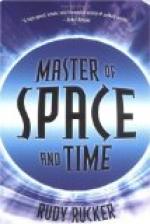Professor Thomson together with Engineer Bright made a careful investigation of the causes of failure. The professor pointed out that had the mirror galvanometer been used with a moderate current the cable could have been continued in successful operation. Ha continued to improve this apparatus and at the same time busied himself with a recording instrument to be used for cable work. Both Thomson and Bright had recommended a larger and stronger cable, and other failures in cable-laying in the Red Sea and elsewhere in the next few years bore out their contentions. But with each failure new experience was gained and methods were perfected. Professor Thomson continued his work with the utmost diligence and continued to add to the fund of scientific knowledge on the subject. So it was that he was prepared to take his place as scientific leader of the next great effort.
X
A SUCCESSFUL CABLE ATTAINED
Field Raises New Capital—The
Great Eastern Secured and
Equipped—Staff
Organized with Professor Thomson as Scientific
Director—Cable
Parts and is Lost—Field Perseveres—The
Cable
Recovered—The Continents
Linked at Last—A Commercial
Success—Public
Jubilation—Modern Cables.
The early ’sixties were trying years for the cable pioneers. It required all of Field’s splendid genius and energy to keep the project alive. In the face of repeated failures, and doubt as to whether messages could be sent rapidly enough to make any cable a commercial success, it was extremely difficult to raise fresh capital. America continued to evince interest in the cable, but with, the Civil War in progress it was not easy to raise funds. But no discouragement could deter Field. Though he suffered severely from seasickness, he crossed the Atlantic sixty-four times in behalf of the great enterprise which he had begun.
It was necessary to raise three million dollars to provide a cable of the improved type decided upon and to install it properly. The English firm of Glass, Eliot & Company, which was to manufacture the cable, took a very large part of the stock. The new cable was designed in accordance with the principles enunciated by Professor Thomson. The conductor consisted of seven wires of pure copper, weighing three hundred pounds to the mile. This copper core was covered with Chatterton’s compound, which served as water-proofing. This was surrounded by four layers of gutta-percha, cemented together by the compound, and about this hemp was wound. The outer layer consisted of eighteen steel wires wound spirally, each being covered with a wrapping of hemp impregnated with a preservative solution. The new cable was twice as heavy as the old and more than twice as strong, a great advance having been made in the methods of manufacturing steel wire.




